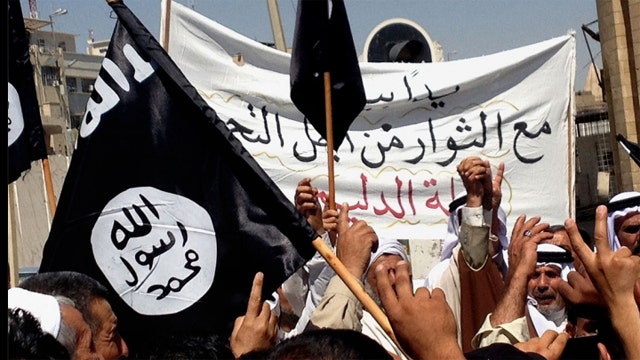Is ISIS partnering with extremists groups in Europe?
James Carafano and Col. Cedric Leighton on the terror group's global reach
ISIS strongholds in Iraq and Syria are the focus of much scrutiny, but there are new concerns the terror network is looking to use other radical movements closer to Europe as a way to expand their reach.
Fox News National Security Analyst KT McFarland spoke to foreign policy experts retired Air Force Col. Cederic Leighton and the Heritage Foundation's James Carafano about the terror network’s influence.
Leighton says there are already indications ISIS is linking up with Russian extremists. “They are riding a wave of popularity – wherever they get traction, that’s where they are going to have a franchise operation … and they are doing a great job of it in the Caucasus at the moment.”
Russia has dealt with terror attacks linked to Russia’s Caucasus region, where extremism runs high. In 2002, militants linked to Chechnya took hostages in a Moscow theater, where 130 people were killed. Then, in 2004, armed Muslim rebels took over a school in southern Russia, killing 331 people.
“At the root of that is an Islamist minority, which has been fighting for independence from the Russian government for a long time and some of that has erupted in real war, real insurgency … the potential for [terrorists] reaching to disaffected groups, that’s only going to grow in Russia,” said Carafano, vice president at the Heritage Foundation.
Russian President Vladimir Putin has tried to lead a strong response to growing terror threat.
“The Russians consider this a domestic issue and they are going after these people because they see them as a threat to the stability to their society,” said Leighton, a former member of the Joint Chiefs of Staff.
Carafano added, “what the Russian response has always been, which will be a heavy-handed physical security response, which in all likelihood is going to stir the pot even more.”
The 2013 Boston Marathon bombing made the U.S. more mindful of the situation in southern Russia, experts say. Dzhokhar Tsarnaev and his brother, Tamerlan, are believed to have had radical training while visiting relatives in the region.
“The Tsarnaev brothers came from Dagestan and that area is right at the crossroads of all of these occurrences, where you got Islamic fundamentalist at work, Russian state trying to prevent it … all of these things could very easily reach our shores, especially if refugees start coming from this area, so there are definitely potential implications for U.S. security,” said Leighton.
Like the U.S., Russia remains concerned over the influence social media can have in radicalizing ISIS sympathizers.
“ISIS winning on the ground in the Middle East and North Africa – that is what makes the brand attractive and that was exploding on the social networks,” said Carafano. “When those social networks link up with those human networks on the ground, that is when you really start having trouble, so that is what has the Russians terrified.”
Carafano and Leighton both agree that the U.S. will closely watch developments in Russia as a way to prevent a potential similar radical movement from growing stateside.





















